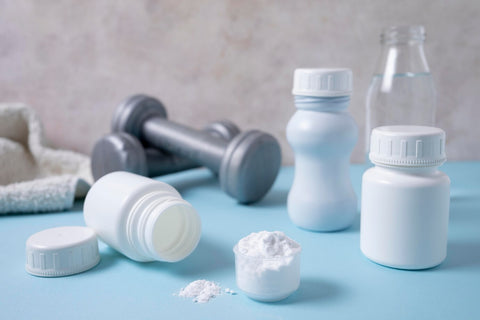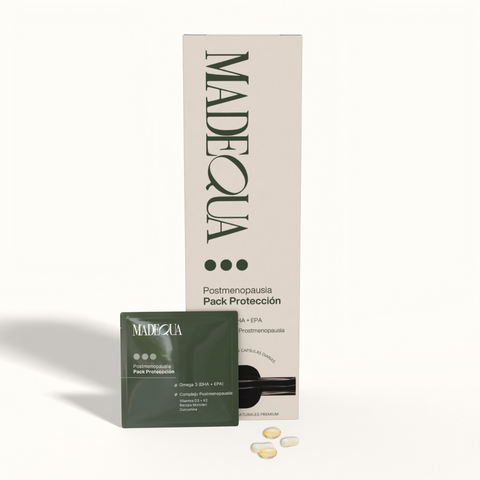During menopause, one of the most noticeable effects is the rapid decrease in muscle mass and loss of strength. These changes can have a significant impact on the quality of life, affecting both mobility and independence of the person. In this context, nutrition takes on an essential role in combating these adverse effects.
Adequate protein intake is critical for maintaining and repairing muscle tissue, while creatine supplementation may offer additional benefits, helping to preserve muscle mass and improve strength.
These nutritional strategies not only help mitigate the effects of menopause, but also promote healthier and more active aging.
What is Creatine?
It is an amino acid (basic component of proteins) present in foods of animal origin, especially in meat and fish, although it is also produced endogenously by our body. Specifically, it is synthesized in the liver, kidneys and pancreas, using the amino acids Arginine, Glycine and Methionine.
Once synthesized (or consumed through diet), creatine is captured by muscle tissue and stored there (95%). The daily requirement of creatine is around 2 grams, obtained from the diet (50%) and through endogenous synthesis (50%), although its quantity varies depending on muscle mass and the intensity of the exercise performed.
At the metabolic level, creatine is involved in meeting the body's energy demands, and is activated as soon as intense muscular effort begins. Creatine is stored in the muscle in the form of phosphocreatine and plays a key role in the resynthesis of adenosine triphosphate (ATP), the main form of energy used by cells.
During intense exercise, our cells need energy (ATP) and when this ATP is consumed, it can be regenerated again thanks to phosphocreatine (which was stored in the muscle). Thus, when intense effort is developed (muscle contraction), phosphocreatine renews ATP. At the end of this process, part of the creatine is converted back into phosphocreatine and the rest into a waste substance (urine and blood) known as creatinine.
As we can see, this energy system comes into play at high speed, but it also runs out quickly. For this reason, it is effective in maximum efforts lasting up to 30 seconds, and of little or no relevance in prolonged efforts.
Benefits of creatine in women
1. Creatine improves performance during exercise
Creatine supplementation increases muscle availability of creatine and phosphocreatine and may therefore improve intense exercise capacity and training adaptations. It allows more work to be done in a series of sets or sprints, which would result in greater gains in strength, muscle mass and/or performance due to improved training quality.
Researchers say that several mechanisms come into play here: the increased availability of energy thanks to the increased turnover of ATP during exercise, but also the delay in neuromuscular fatigue, meaning you will tire less quickly and be able to endure exercise for longer.
2. Creatine increases muscle mass and strength
95% of all creatine is stored in skeletal muscles, so it makes sense that supplementation can help you gain strength and increase muscle growth.
Creatine supplementation may increase the amount of ATP and energy produced during intense exercise, thereby possibly increasing muscle power, repetitions, and exercise volume, which may subsequently contribute to muscle performance and hypertrophy (muscle growth) over the course of a training period.
According to the European Food Safety Authority (EFSA), creatine supplementation increases physical performance during short-duration, high-intensity and repeated exercises. To obtain the intended effect, 3 g of creatine should be consumed per day. Although it should be noted that the target population is adults who perform high-intensity exercise.
3. Counteracts the loss of muscle mass and bone mass
During menopause, the protective effect of estrogen is lost, leading to an accelerated loss of muscle and bone mass. In addition, an inflammatory environment predominates in the body at this stage.
Bone is a living tissue that is constantly forming and destroying, so it is important to maintain a balance. During menopause, the balance tends to tip towards bone destruction, which greatly increases the risk of osteoporosis.
Creatine supplementation in combination with resistance training has been shown to counteract muscle, bone and strength loss by reducing inflammation, oxidative stress and bone resorption (the process by which bone is destroyed), while increasing bone formation.
4. Creatine against sarcopenia and osteoporosis
Perhaps one of the most promising conditions that could benefit from creatine supplementation is age-related sarcopenia. Sarcopenia is defined as a progressive and generalized condition of skeletal muscle (i.e., decreased muscle mass, strength, and function) that is associated with an increased likelihood of adverse outcomes, such as falls, fractures, physical disability, and mortality.
Although resistance training is considered the cornerstone of sarcopenia treatment, there is increasing evidence that creatine supplementation may help, thereby mitigating sarcopenia rates.
This condition is very common during menopause due to the hormonal changes that occur in a woman's body. The decrease in estrogen causes a loss of bone mineral density that results in osteoporosis and accelerated loss of muscle mass that results in sarcopenia.
There are several hypotheses that could explain how creatine supplementation could attenuate age-related muscle and bone loss and they are based on the biomechanical and biochemical connections established between muscle and bone.
In addition, creatine supplementation increases insulin-like growth factor (IGF-1) levels and simultaneously regulates myostatin levels. Increased IGF-1 promotes osteoblastogenesis (bone formation), while myostatin initiates osteoclastogenesis, i.e. bone resorption (bone destruction).
Therefore, regardless of the mechanical interaction, there is cross-communication between muscle and bone cells, which represents another possible pathway through which creatine would have the potential to attenuate both diseases.
5. Creatine helps with better cognitive function and mood
Mood swings or symptoms of anxiety and depression are common in women going through menopause, due to the hormonal changes experienced during this stage. Creatine supplementation helps reduce mental fatigue, which could help you perform more frequent or intense workouts, and has been shown to help with certain depressive disorders.
Creatine provides a pro-energetic effect on brain chemistry, promotes cell survival, and influences energy production and use in the brain. There is clinical evidence of the positive effects of creatine supplementation on mood by restoring energy levels and brain homeostasis (balanced state).
A study conducted in 2021 has shown that the higher the levels of creatine in the blood, the higher the levels of serotonin and dopamine (hormones responsible for feelings of happiness and satisfaction) will also be and that creatine supplementation could benefit the use of energy in the brain by stabilizing mood swings. In addition to improving cognitive performance and reducing mental fatigue in situations of anxiety and stress.
Does it have any side effects?
The most common misconceptions surrounding creatine are that you will gain weight or experience bloating or intestinal problems, but this is not true.
The alleged kidney problems you may have heard about are also not true, because it is a misconception based on a lack of understanding of the effects of creatine on creatinine and its role in kidney damage.
Experimental and controlled research indicates that creatine supplementation, when taken at recommended doses, does not cause kidney damage and/or kidney dysfunction in healthy individuals.
Studies have consistently shown that creatine supplementation increases intramuscular creatine concentrations, may improve exercise performance, and/or enhance training adaptations. Research has indicated that creatine supplementation may enhance post-exercise recovery, injury prevention, thermoregulation, rehabilitation, and neuroprotection of the spinal cord and/or concussion.
Several clinical applications of creatine supplementation have also been studied in neurodegenerative diseases (e.g., muscular dystrophy, Parkinson's, Huntington's disease), diabetes, osteoarthritis, fibromyalgia, aging, cerebral and cardiac ischemia, depression in adolescents, and pregnancy.
Creatine helps prevent age-related deterioration, and is a very interesting anti-aging supplement. It can be supplemented with Madequa supplements, specific for each stage of menopause, achieving an even more complete and personalized supplementation to the needs of each woman.
How do we take Creatine?
It is important to note that supplementation must always be accompanied by good eating habits, an active lifestyle and healthy routines. In the case of creatine, increasing its dose through food is very difficult because we would have to eat huge amounts of food. In addition, it is important to always consult a health professional.
Creatine can be taken with Madequa supplements, which are also tailored to the specific needs of women at each stage of menopause. If you don't know what stage of menopause you are in, you can take our test to find out which pack would be most suitable, along with personalized lifestyle guidelines.
Creatine works by accumulation, that is, when it reaches certain concentration doses in the cells; therefore, it is recommended to take it every day, regardless of whether you have trained or rested, if you are on vacation, etc.
The general dosage is 3-5 g daily, but the protocol must be individualized as it will vary depending on body weight and objectives. Therefore, it is essential to always consult a health professional.
It is important to note the fact that we can choose any brand we want, but we should always make sure that it has the CREAPURE seal that guarantees 99.99% purity, which minimizes the risk of side effects and maximizes the effectiveness of the supplement.
References
Kreider RB, Jäger R, Purpura M. Bioavailability, Efficacy, Safety, and Regulatory Status of Creatine and Related Compounds: A Critical Review. Nutrients. 2022;14(5):1035. doi:10.3390/nu14051035.
Desai I, Wewege MA, Jones MD, Clifford BK, Pandit A, Kaakoush NO, Simar D, Hagstrom AD. The Effect of Creatine Supplementation on Resistance Training-Based Changes to Body Composition: A Systematic Review and Meta-analysis. J Strength Cond Res. 2024. doi: 10.1519/JSC.0000000000004862.
Antonio J, Candow DG, Forbes SC, Gualano B, Jagim AR, Kreider RB, Rawson ES, Smith-Ryan AE, VanDusseldorp TA, Willoughby DS, Ziegenfuss TN. Common questions and misconceptions about creatine supplementation: what does the scientific evidence really show? J Int Soc Sports Nutr. 2021;18(1):13. doi:10.1186/s12970-021-00412-w.
Smith-Ryan AE, Cabre HE, Eckerson JM, Candow DG. Creatine Supplementation in Women's Health: A Lifespan Perspective. Nutrients. 2021;13(3):877. doi:10.3390/nu13030877.
Arce, V.M., Carneiro, I., Fernandez-Nocelo, S., & Devesa, J. Myostatin: an autocrine/paracrine regulator of muscle development. Endocrinology and Nutrition. 2005; 52(7), 350–357. doi:10.1016/s1575-0922(05)71031-7
Chilibeck PD, Candow DG, Landeryou T, Kaviani M, Paus-Jenssen L. Effects of Creatine and Resistance Training on Bone Health in Postmenopausal Women. Med Sci Sports Exerc. 2015;47(8):1587-95. doi: 10.1249/MSS.0000000000000571.
Kreider RB, Kalman DS, Antonio J, Ziegenfuss TN, Wildman R, Collins R, Candow DG, Kleiner SM, Almada AL, Lopez HL. International Society of Sports Nutrition position stand: safety and efficacy of creatine supplementation in exercise, sport, and medicine. J Int Soc Sports Nutr. 2017; 14:18. doi:10.1186/s12970-017-0173-z.
Wilkins, B. Creatine for Women: What It Is, How It Works, Proven Benefits, and the Truth About Side Effects. Women's Health. 2024.
Kirk B, Feehan J, Lombardi G, Duque G. Muscle, Bone, and Fat Crosstalk: the Biological Role of Myokines, Osteokines, and Adipokines. Curr Osteoporos Rep. 2020;18(4):388-400. doi:10.1007/s11914-020-00599-y.
Brosnan JT, Brosnan ME. Creatine: endogenous metabolite, dietary, and therapeutic supplement. Annu Rev Nutr. 2007;27:241-61. doi: 10.1146/annurev.nutr.27.061406.093621.




Comments (0)
There are no comments for this article. Be the first one to leave a message!